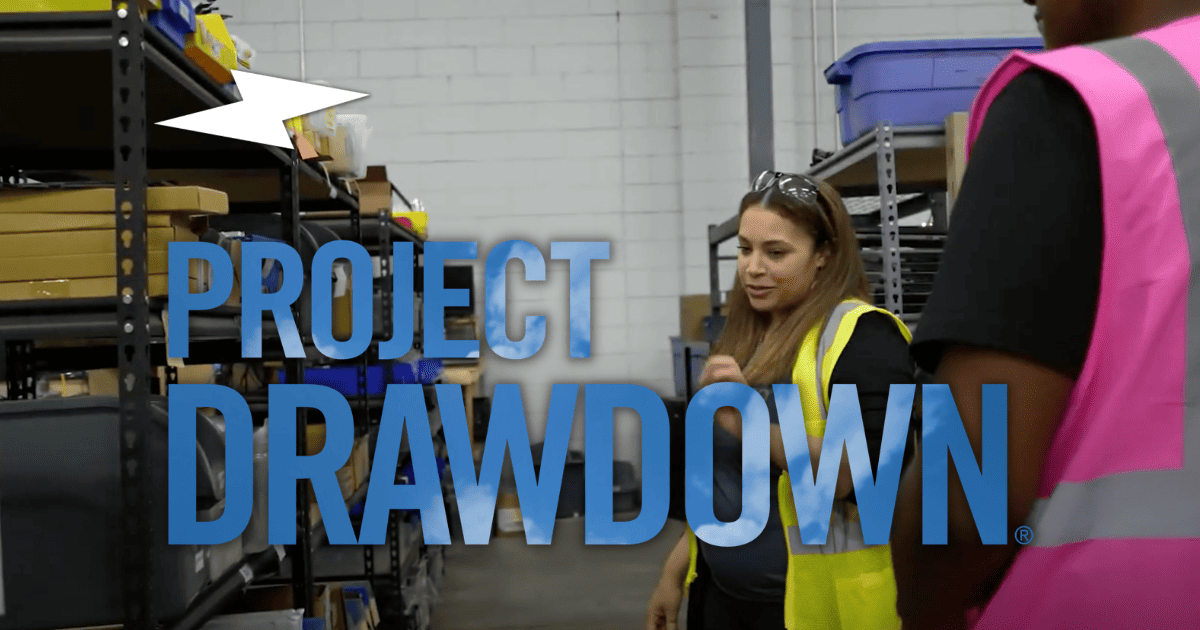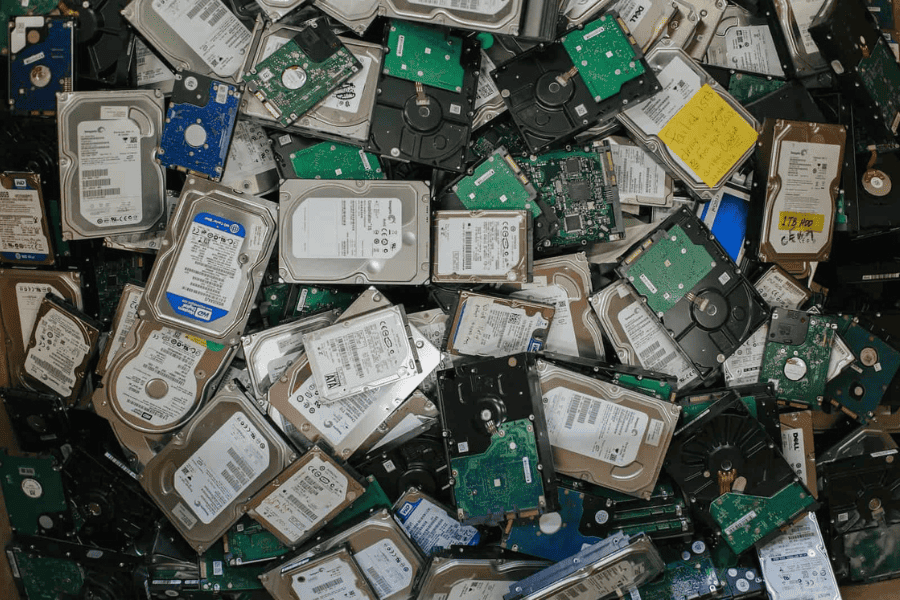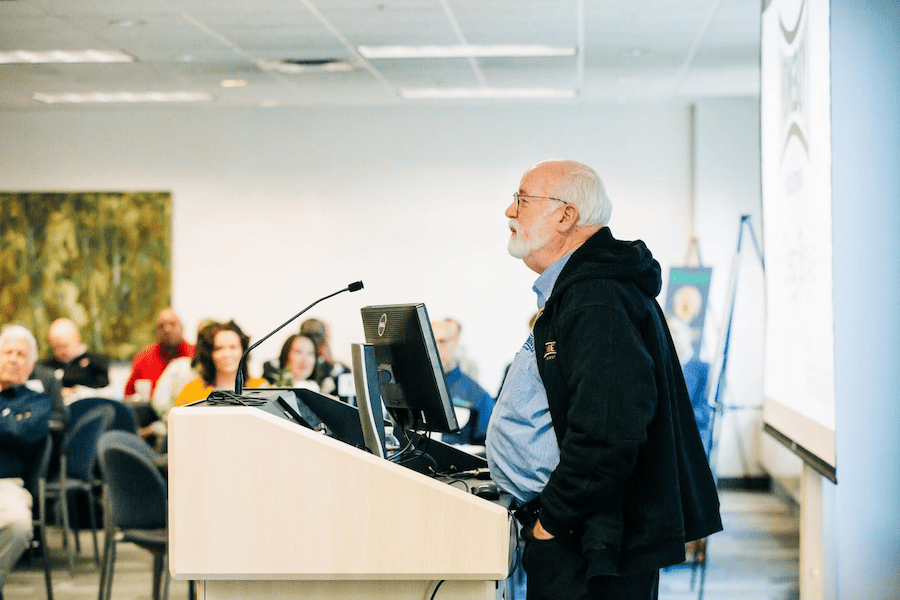
“Every one of us has made some dumb mistake in our lives and most of us are able to move forward from that… We are all defined by our futures [not our past mistakes] …and you should not have to carry that with you forever, if you have done what you have needed to do to make it right.”
Emily’s Story
How can we ensure that justice is part of our conservation efforts? Repowered, a non-profit social enterprise in Minneapolis is working to do just that by creating fair chances for people, the planet, and technology. Emily Mauter is the Director of Advancement at Repowered. She is proud of their work to create new opportunities for electronics through recycling and refurbishing e-waste while simultaneously providing workforce development and reintegration opportunities for people who have experienced incarceration. As one of the most prominent collectors of e-waste in Minnesota, Repowered is also helping achieve drawdown and has processed over 40 million pounds of electronics to date, keeping e-waste out of our landfills and reducing greenhouse gas emissions that contribute to a warming planet.
Discussion Questions
One of the most important things you can do regarding climate change is talk about it.
- It can be difficult for people who have experienced incarceration to re-enter society and to feel welcomed and supported in finding meaningful employment and workforce development. Repowered believes in second chances for people and electronics. Emily says it is “inequitable to continue to punish people for a thing that they are trying to move forward from” and adds that it is essential to have empathy for people who have experienced incarceration and are just trying and want to do better. How can we unlearn or alleviate the stigma associated with incarceration for people who have experienced imprisonment? To reach drawdown, how can every person find their purpose and potential to be a part of climate solutions, no matter their past?
- E-waste is the planet’s fastest-growing waste stream—worldwide, more than 50 million metric tons of e-waste are generated yearly! These numbers make it critically important to find ways to safely dispose of these items responsibly, keeping the personal data in many of our electronics private and reducing dangerous environmental pollution from precious metals and minerals that many electronics contain. Tech crews at Repowered take old electronics, pull them apart, and then sort and retain parts that can be refurbished or repaired for resale. Making electronics more affordable for the community, with sales going back to support the mission at Repowered. Do you have old electronics that could be refurbished or recycled? How might the work at Repowered inspire you to reconsider the possibilities for e-waste?
- Northern Minnesota is home to the pristine Boundary Waters, an international wilderness destination renowned for its natural beauty. It is also a contentious site for mining precious minerals, like Cobalt, used for consumer goods, such as electronics. Instead of contributing to further mining these materials, Repowered’s work to process e-waste is helping to alleviate the environmental degradation of our natural world, including places like the Boundary Waters. Have you ever experienced an area of pristine wilderness in our world? Do you remember the sights, sounds, and smells? Is this a place you want to see protected and preserved in the future?
- While both individual environmental responsibility and corporate environmental responsibility are crucial, Emily points out that it is helpful to know the difference in the size of the impact created, offering, for example, that “using a reusable straw is not going to go as far as a giant corporation using more environmentally ethical practices.” What examples of individual climate solutions might you practice in your home? What are examples of collective climate solutions that exist in your community? What is the difference in the size of the impact created that Emily is referring to, and how can you engage in both?
- One way that Emily deals with her climate grief is by understanding what is within her control to change. Instead of focusing on the scale of the climate crisis, Emily finds it helpful to focus on her work at Repowered and what she can do within her control that is making a difference for both people and the planet. What is one thing within your control when thinking about climate change? Would this approach to focus on what you can control help reduce grief related to climate change? Why or why not?
- Emily describes her laughter as a superpower and a reminder that you can have fun and even find joy while making a positive change on serious issues like climate change and reintegration after incarceration. How can laughter be helpful to incorporate when working on climate change? Is there a time when you recall having fun or using humor in a serious situation? What was the result?
Learn More
Learn about the solutions in this story.
- Climate Solutions Cluster: Improve Materials; Use Waste
- For more on all of the Drawdown climate solutions, visit drawdown.org/solutions.
- Learn more about Emily’s work: Repowered
Explore Climate Solutions 101, the world’s first major educational effort focused solely on climate solutions. This video series combines Project Drawdown’s trusted resources with the expertise of inspiring, scientifically knowledgeable voices from around the world: drawdown.org/climate-solutions-101.
Take Action
- Drawdown Ecochallenge, presented by Ecochallenge.org, is a fun and social way to take measurable action on the top solutions to global warming. Take the challenge, and see how a few weeks of action add up to a lifetime of change for you and the planet. If you want to take action through Industry like Emily is, visit https://drawdown.ecochallenge.org/challenges/industry
- The Drawdown Labs Job Function Action Guides are practical and shareable resources that highlight specific, high-impact climate actions employees in common corporate professions can take at work.
- ChangeX connects people with proven ideas for strengthening communities with the resources needed to implement those changes. Explore countless ways to improve your community and help the world reach drawdown.
- Climate Generation‘s Green Careers for a Changing Climate Instructional Supplement (for Grades 6-8)contains resources to help young people learn about Green STEM Careers — careers that can help solve the impacts of climate change using STEM skills. Throughout this instructional supplement, students will be using the resource Drawdown to make important connections to solutions that these careers will implement.
- Solutions Journalism Network highlights the importance of reporting stories of climate solutions in the media to create a more equitable and sustainable world. Visit their Teaching Climate Solutions. resource to find curated collections and the latest examples of climate solutions journalism.
- SubjectToClimate (StC)(link is external) is a nonprofit online connector for K-12 leaders of all subjects to find materials on climate change at no cost. Explore StC’s educator-generated database to connect to Project Drawdown-based climate education resources.
•••
PROJECT DRAWDOWN
TWIN CITIES: EPISODE #5 —WEDNESDAY, FEBRUARY 15, 2023
Recent News & Articles

Celebrating Juneteenth

Harnessing the Economic Potential of E-Waste Recycling: A New MN Study

